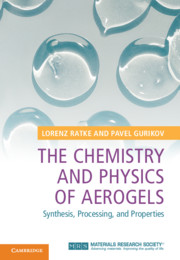Book contents
- Frontmatter
- Dedicatioin
- Contents
- Preface
- 1 Introduction
- 2 Chemical Synthesis of Aerogels from Monomeric Precursors
- 3 Chemical Synthesis of Aerogels from Polymeric Precursors
- 4 Gelation
- 5 Drying of Wet Gels
- 6 Morphology of Aerogels
- 7 Density: Models and Measures
- 8 Specific Surface Area
- 9 Pores and Pore Sizes
- 10 Diffusion in Aerogels
- 11 Permeability for Gases
- 12 Thermal Properties
- 13 Mechanical Properties of Aerogels
- 14 How to Cook Aerogels: Recipes and Procedures
- Appendix A Thermodynamics and Phase Separation in Immiscibles
- Appendix B Flory–Huggins Theory of Polymer Solutions
- Appendix C A Brief Review on Scattering
- Appendix D Mathematics of Polycondensation
- Appendix E Time-Dependent Heat Transfer through an Isolated Tube
- References
- Index
4 - Gelation
Published online by Cambridge University Press: 03 December 2021
- Frontmatter
- Dedicatioin
- Contents
- Preface
- 1 Introduction
- 2 Chemical Synthesis of Aerogels from Monomeric Precursors
- 3 Chemical Synthesis of Aerogels from Polymeric Precursors
- 4 Gelation
- 5 Drying of Wet Gels
- 6 Morphology of Aerogels
- 7 Density: Models and Measures
- 8 Specific Surface Area
- 9 Pores and Pore Sizes
- 10 Diffusion in Aerogels
- 11 Permeability for Gases
- 12 Thermal Properties
- 13 Mechanical Properties of Aerogels
- 14 How to Cook Aerogels: Recipes and Procedures
- Appendix A Thermodynamics and Phase Separation in Immiscibles
- Appendix B Flory–Huggins Theory of Polymer Solutions
- Appendix C A Brief Review on Scattering
- Appendix D Mathematics of Polycondensation
- Appendix E Time-Dependent Heat Transfer through an Isolated Tube
- References
- Index
Summary
Gelation describes the transformation from a liquid or fluid state to a somewhat solid state, well known from daily experience, making, for instance, a jelly pudding. Gels and gelation are studied quite extensively in chemistry and physics, and especially over the past three decades theoreticians have discussed the formation of gels and the relation between structure and properties quite extensively (percolation theory, fractals). In this chapter, we will first discuss the viscosity of solutions and how it changes during gelation. For an understanding of modern equipment, to analyse gelation, it is important to briefly discuss viscoelasticity andsimple models for a viscous fluids. We thendescribe how gelation is measured, from very simple methods to more elaborate ones. The chapter closes with a survey of theoretical models for gelation such as percolation, diffusion-limited cluster aggregation, mean field theory using the Smoluchowski equation, scaling analysis and polymerisation-induced phase transformation (PIPS). For all these models, predictions of gel time can be made, showing how the composition of the solution, the viscosity and the temperature affect it.
Keywords
- Type
- Chapter
- Information
- The Chemistry and Physics of AerogelsSynthesis, Processing, and Properties, pp. 92 - 139Publisher: Cambridge University PressPrint publication year: 2021



